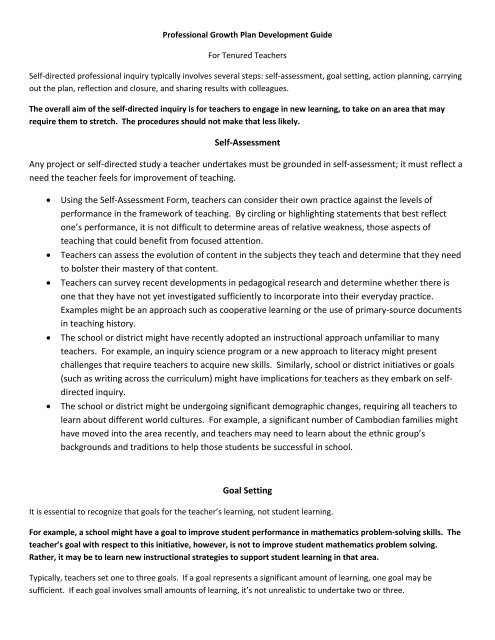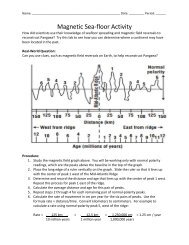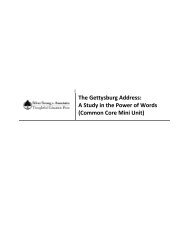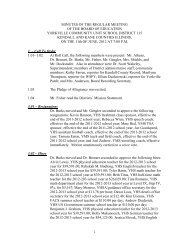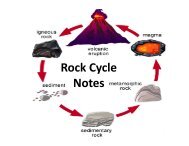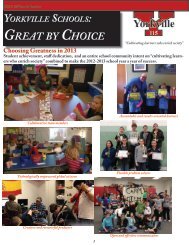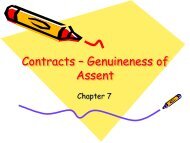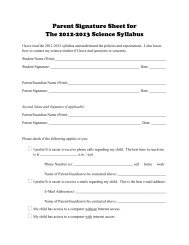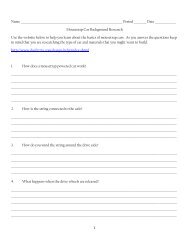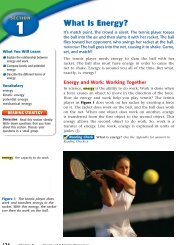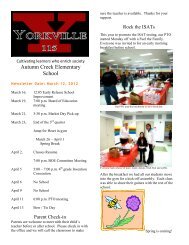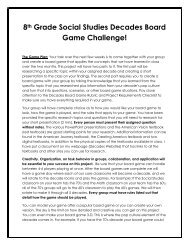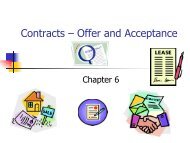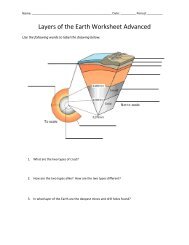Tenured Teacher professional growth plan development guide
Tenured Teacher professional growth plan development guide
Tenured Teacher professional growth plan development guide
You also want an ePaper? Increase the reach of your titles
YUMPU automatically turns print PDFs into web optimized ePapers that Google loves.
Professional Growth Plan Development Guide<br />
For <strong>Tenured</strong> <strong>Teacher</strong>s<br />
Self‐directed <strong>professional</strong> inquiry typically involves several steps: self‐assessment, goal setting, action <strong>plan</strong>ning, carrying<br />
out the <strong>plan</strong>, reflection and closure, and sharing results with colleagues.<br />
The overall aim of the self‐directed inquiry is for teachers to engage in new learning, to take on an area that may<br />
require them to stretch. The procedures should not make that less likely.<br />
Self‐Assessment<br />
Any project or self‐directed study a teacher undertakes must be grounded in self‐assessment; it must reflect a<br />
need the teacher feels for improvement of teaching.<br />
<br />
<br />
<br />
<br />
<br />
Using the Self‐Assessment Form, teachers can consider their own practice against the levels of<br />
performance in the framework of teaching. By circling or highlighting statements that best reflect<br />
one’s performance, it is not difficult to determine areas of relative weakness, those aspects of<br />
teaching that could benefit from focused attention.<br />
<strong>Teacher</strong>s can assess the evolution of content in the subjects they teach and determine that they need<br />
to bolster their mastery of that content.<br />
<strong>Teacher</strong>s can survey recent <strong>development</strong>s in pedagogical research and determine whether there is<br />
one that they have not yet investigated sufficiently to incorporate into their everyday practice.<br />
Examples might be an approach such as cooperative learning or the use of primary‐source documents<br />
in teaching history.<br />
The school or district might have recently adopted an instructional approach unfamiliar to many<br />
teachers. For example, an inquiry science program or a new approach to literacy might present<br />
challenges that require teachers to acquire new skills. Similarly, school or district initiatives or goals<br />
(such as writing across the curriculum) might have implications for teachers as they embark on selfdirected<br />
inquiry.<br />
The school or district might be undergoing significant demographic changes, requiring all teachers to<br />
learn about different world cultures. For example, a significant number of Cambodian families might<br />
have moved into the area recently, and teachers may need to learn about the ethnic group’s<br />
backgrounds and traditions to help those students be successful in school.<br />
Goal Setting<br />
It is essential to recognize that goals for the teacher’s learning, not student learning.<br />
For example, a school might have a goal to improve student performance in mathematics problem‐solving skills. The<br />
teacher’s goal with respect to this initiative, however, is not to improve student mathematics problem solving.<br />
Rather, it may be to learn new instructional strategies to support student learning in that area.<br />
Typically, teachers set one to three goals. If a goal represents a significant amount of learning, one goal may be<br />
sufficient. If each goal involves small amounts of learning, it’s not unrealistic to undertake two or three.
Goals established by schools and districts may be appropriate for inclusion in a teacher’s individual goals for <strong>professional</strong><br />
<strong>growth</strong>; it depends on the situation. Goals that address student learning, where appropriate, may be important for<br />
teachers to translate into their own learning efforts.<br />
For example, a high school seeking improvement in students’ writing skills might ask all teachers, in all subjects, to<br />
incorporate student writing into their courses. A science teacher could well incorporate learning how to teach<br />
students to write about science into a <strong>professional</strong> <strong>growth</strong> goal. However, a math teacher might have concentrated<br />
on this area several years ago, so a focus on student writing in mathematics would not represent new learning for<br />
that teacher.<br />
Simply stated, whether teachers’ <strong>professional</strong> <strong>growth</strong> <strong>plan</strong>s reflect district or building goals depends on whether they<br />
are suitable to the individuals concerned.<br />
Characteristics of Good Goals for Professional Growth<br />
<br />
The goal should be related to the teacher’s responsibilities.<br />
This requirement would disqualify a goal such as pursuing an administrative credential or learning a skill (that<br />
one does not teach) purely for personal reasons, such as pottery or ballroom dancing.<br />
<br />
The goal should not be part of a teacher’s everyday teaching responsibilities.<br />
Thus, for example, “implementing the new reading program” is not a <strong>growth</strong> goal; it is part of the teacher’s job<br />
responsibilities. However, it is possible that implementing a new program‐for example, in science‐will require a<br />
teacher to learn important new skills, such as how to <strong>guide</strong> students in scientific inquiry. The learning of those<br />
skills would represent valuable new learning.<br />
<br />
<br />
The goal should be something important to the teacher.<br />
A goal may be stated in terms of a project or action research.<br />
<br />
To investigate the effectiveness of a certain practice or to create some new materials to help students<br />
understand the European settler’s expansion into the western territories from the native’s point of view would<br />
certainly qualify as a viable goals.<br />
Goals should be stated as outcomes, not as activities.<br />
<br />
Therefore, taking students on a study trip to the aquarium is not a <strong>professional</strong> <strong>growth</strong> goal. However,<br />
developing a curriculum incorporating the resources of the aquarium could be.<br />
As part of establishing a goal, a teacher should be able to indicate what would count as evidence of success.<br />
This indication should be stated in specific terms rather than a general statement such as “Students will improve<br />
their reading skills.” Stating evidence may require the teacher to collect data of some sort, as appropriate to the<br />
goal. If the goal is a project to ascertain the effectiveness of a new instructional strategy, samples of student<br />
work would be appropriate. If the goal relates to a teacher’s use of a general approach, such as differentiation<br />
of instruction, the evidence would consist of the teacher’s documentation of how she differentiated, and the<br />
results achieved.
Goal Analysis Examples<br />
Statement Goal? Comments<br />
No<br />
I’m in a master’s program<br />
and need<br />
to finish my dissertation this<br />
year.<br />
That’s my primary goal for<br />
the year.<br />
I want to implement the new<br />
reading series.<br />
I’m working with a new team<br />
this year. My goal is to<br />
concentrate on teaming.<br />
I want to create rubrics to<br />
use in my classes, especially<br />
for long‐term projects.<br />
I need to find a more<br />
effective way to cover the<br />
material in my history<br />
classes so students can go<br />
into greater depth.<br />
I’m teaching 3 rd grade for the<br />
first time. My goal is to<br />
become familiar with the 3 rd<br />
grade curriculum.<br />
I’m new to the system so I<br />
want to be sure I know the<br />
discipline policies and follow<br />
them in my classroom.<br />
I want to get parents more<br />
involved in their parents<br />
education.<br />
No<br />
Maybe<br />
Yes<br />
Yes<br />
No<br />
No<br />
Maybe<br />
Goals should relate to the teacher’s learning about a new skill or<br />
technique or about student learning. This goal is an appropriate goal<br />
for a teacher’s <strong>professional</strong> advancement but not for a focus during a<br />
year of <strong>professional</strong> inquiry.<br />
Every teacher in the school is obliged to implement the new reading<br />
series. This is a requirement of employment. However, if the new<br />
reading series includes an approach to teaching literature that is<br />
unfamiliar, the goal might be written like this: “I want to improve my<br />
teaching of literature so the students both enjoy it and become<br />
proficient at literary analysis.”<br />
This statement is not clear as to what is meant by “concentrate on.”<br />
and it’s possible that in practice this goal would result simply in a<br />
teacher’s attending team meetings as scheduled. A better way to<br />
state this goal could be this: “I am working with a new team this<br />
year, and I will be facilitating some of the meetings. I want to learn<br />
how to help a group function productively.”<br />
Although this goal is not stated in terms of teacher learning, creating<br />
rubrics inevitably involves considerable learning. The action <strong>plan</strong><br />
would, presumably, spell out an iterative process of developing<br />
rubrics, trying them with student projects, and then revising them<br />
based on the experience. This process reflects real learning.<br />
This goal would be better stated like this: “I want to learn how to<br />
teach my history classes in such a way that students go into greater<br />
depth but also learn all important material.” This involves<br />
understanding student learning and motivation, trying new<br />
techniques, and evaluating their results.<br />
Becoming familiar with the 3 rd grade curriculum is essential to being<br />
successful in that assignment. But gaining such familiarity involves<br />
work that is critical to the teacher’s position and does not represent<br />
new learning for the teacher.<br />
This goal represents the work all teachers new to a school must<br />
undertake, and it illustrates the steep learning curve that is inherent<br />
in any new assignment. But it is, essentially, a matter of<br />
implementing school policies, not engaging in new learning related<br />
to instruction.<br />
Whether this is a goal or not depends on the reason behind the<br />
statement. If the teacher intends to simply reach out to parents, it<br />
simply represents work teachers must do as part of their assignment.<br />
However, if the teacher has been trying to engage parents but has<br />
not succeeded, the goal might represent the teacher’s desire to learn<br />
new techniques to reach parents of a different culture or parents<br />
who are recent immigrants to the area. This new learning would,<br />
therefore, be the goal, with increased parent involvement as<br />
evidence that the teacher had been successful.
Action Plan<br />
A <strong>professional</strong> <strong>growth</strong> <strong>plan</strong> is a document that outlines the activities teachers will undertake in pursuing their goals for<br />
<strong>professional</strong> <strong>growth</strong>. These <strong>plan</strong>s need not be elaborate; in fact, the simpler they are the better. The <strong>plan</strong> should<br />
include a reasonable sequence of activities the teacher expects to do in pursuing the goal and estimated completion<br />
dates for each activity. The <strong>plan</strong> can include various types of activities, such as:<br />
<br />
<br />
<br />
<br />
<br />
Reading books or articles<br />
Taking a workshop or course<br />
Conferring, observing or being observed by colleagues<br />
Trying new strategies in your class<br />
Inviting administrators to observe and provide feedback<br />
The <strong>plan</strong> should also include needed resources, such as:<br />
<br />
<br />
Class coverage for peer observations or school site visits<br />
Books or journals not available in District <strong>professional</strong> libraries<br />
Carrying Out the Plan<br />
For serious <strong>professional</strong> learning to occur, teachers must devote time to the effort. Teaching is demanding work that<br />
can make completing the activities in the <strong>plan</strong> a challenge. But if ongoing <strong>professional</strong> learning is recognized as<br />
important to effective performance, teachers must take it seriously.<br />
The Yorkville CUSD #115 <strong>professional</strong> <strong>development</strong> <strong>plan</strong> includes a mid‐year progress meeting that can assist<br />
administrators and teachers identify obstacles that may be impeding the progress of the action <strong>plan</strong>. This mid‐year<br />
meeting also provides accountability to the <strong>professional</strong> <strong>growth</strong> <strong>plan</strong> as progress according to the action <strong>plan</strong> should be<br />
demonstrated.<br />
Reflection and Closure<br />
The last and critical step in self‐directed <strong>professional</strong> inquiry is reflection and closure. As with reflection on classroom<br />
practice, the reflection step is, arguably, the most important of the entire process.<br />
The purpose of a reflection conference is not to “trick” teachers or to convey a “gotcha” message. Rather, it is to enable<br />
teachers to engage in a systematic reflection on what has been, it is hoped, a valuable process of <strong>professional</strong> learning.<br />
<strong>Teacher</strong> and administrators should <strong>plan</strong> to devote at least 30 minutes to the reflection conference. However, it is<br />
possible for several teachers to meet jointly with an administrator for this purpose; in that case, it would require more<br />
than 30 minutes total, but not as long as if each conference were conducted individually.<br />
Sharing Results with Colleagues<br />
Although not a formal part of the process of self‐directed <strong>professional</strong> inquiry, a final step of sharing results with<br />
colleagues is highly recommended.<br />
This activity is important for multiple reasons; first of all, setting aside prime time for collegial sharing reinforces the<br />
concept that every school has <strong>professional</strong> educators who know a lot about their practice and from whom other<br />
educators can learn. Furthermore, <strong>professional</strong> sharing enhances the concept of a culture of <strong>professional</strong> inquiry – an<br />
important part of a school’s overall culture.
Second, when teachers know that they will be asked to describe their <strong>professional</strong> activities for their colleagues and<br />
inform others about what they have learned about their self‐directed inquiry, they promote ownership, pride and<br />
energy to it.<br />
<strong>Tenured</strong> <strong>Teacher</strong><br />
Professional Growth Plan Development Guide (Sample)<br />
Staff members should develop their <strong>professional</strong> <strong>growth</strong> <strong>plan</strong> with the following in mind:<br />
It should be based on your self‐assessment, your administrator’s input, and any school or district initiatives and what<br />
goal you have identified? What is an area of knowledge or skill that you would like to strengthen?<br />
Example goal: I intend to enhance my skills in cooperative learning and the use of group work in my teaching.<br />
Describe the connection between this goal and your teaching assignment.<br />
I teach middle school social studies; many of the topics lend themselves to group work, but I don’t have the<br />
confidence in my skill to incorporate them in the classroom.<br />
What will success in this goal look like? How will you know when you have achieved it? What would count as evidence<br />
of success?<br />
1. Students will be able to assume different roles in group work.<br />
2. An observer would notice students working productively together, with all students contributing.<br />
3. Students themselves will report that they find group strategies productive for learning.<br />
Describe the activities you will do to work toward your goal, and appropriate time lines.<br />
Activity<br />
I <strong>plan</strong> to:<br />
Read two articles and a book on cooperative learning.<br />
Enroll in weekend course devoted to cooperative learning.<br />
Observe two teachers in the school who use cooperative<br />
learning and discuss their techniques with them.<br />
Teach my students the skills of respectful group work, and<br />
about the different roles in group work.<br />
Begin incorporating group work into my classes, where<br />
appropriate.<br />
Invite a colleague to observe my class while students are<br />
engaged in group work to offer me feedback.<br />
Make a faculty presentation to share what I have learned.<br />
Time Line<br />
Activities will be completed by:<br />
September 30<br />
October 31<br />
November 30<br />
December 15<br />
February 15<br />
March 31<br />
May 30<br />
What resources will you need to better achieve your goal?<br />
<br />
<br />
<br />
Books and journals from the school’s <strong>professional</strong> library.<br />
Tuition for the weekend course.<br />
Class coverage to enable me to visit colleagues, if it is not possible during my preparation time.


